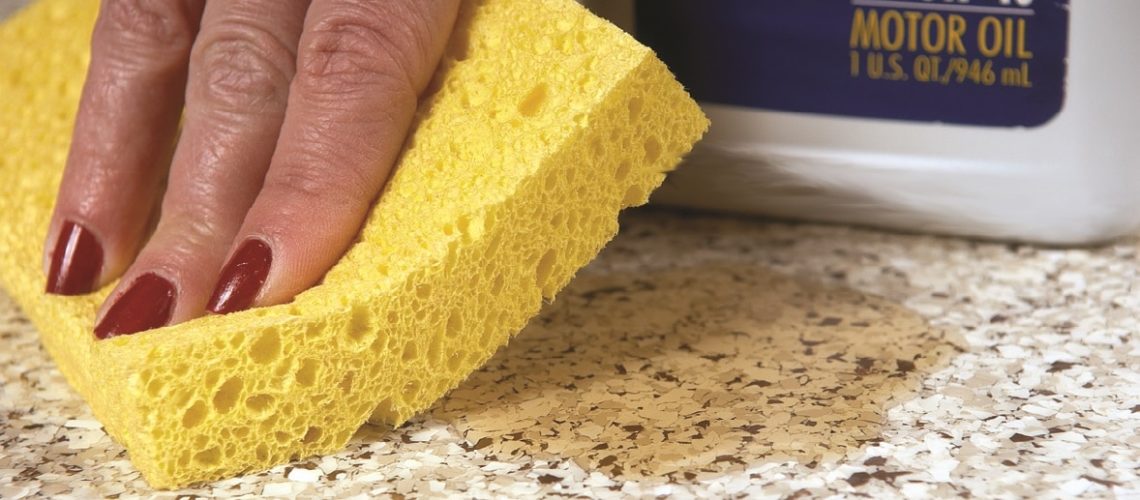How to Clean Epoxy Flooring
If you’re wondering how to clean epoxy floors, start by learning the proper techniques and maintenance practices. This can help keep your floor looking new for many years.
Newly installed seamless epoxy polymer floors have a glossy shine, which is often what owners desire maintaining. All polymer floors are subject to scratching from dust, dirt, sand, and debris.
The kind of debris combined with the type of traffic the floor is exposed to will determine the extent of the scratches that can dull the look of the epoxy floor. Proper cleaning procedures performed on a regular basis will substantially reduce the dulling and help your epoxy floor last longer.
Whether you’re trying to figure out how to clean your epoxy garage floor, home space or other environment, let’s dive into the best ways to clean your epoxy floors this year!
Selecting The Right Epoxy Floor Cleaner
For general cleaning, we recommend 1105 ArmorClean or neutral pH cleaners, disinfectant cleaners, general-purpose cleaners, and non-butyl degreasers. Some soap-based cleaners can leave a haze and dull the appearance of an epoxy floor.
To determine how the cleaner will perform, first test the cleaner in a small area utilizing your cleaning technique. If the cleaner or technique dulls or modifies the coating, change the cleaning material and/or the procedure. Try varying dilution ratios before establishing a regular cleaning program.
Spot Cleaning Epoxy Flooring
All floors should be swept, dust mopped, or wet mopped daily to remove dirt and debris. Spot clean heavily-soiled areas by hand using a soft bristle broom, deck broom, or floor scrubber with a green pad and Thermal-Chem 1105 ArmorClean Product.
View more Thermal-Chem product data sheets Thermal-Chem Product Data Sheets.
Epoxy Floor Stains
Some minor stains can be lightly scrubbed out using a standard kitchen scrubbing sponge or a soft brush and warm water. Avoid using abrasive cleaning agents like steel wool or a Comet-type cleaner as they will scratch and dull the surface.
Harsh cleaning chemicals or cleaning compounds with citrus or acid in them should be avoided as well. Citrus and vinegar-type cleaners can sometimes hurt epoxy floors.
Oil and chemicals
Any fluids leaking from vehicles like antifreeze, oil, gas, etc, should be cleaned up quickly using rags or paper towels and disposed of properly. The most important thing you can do is to limit the amount of time these liquids are in contact with your epoxy floor to reduce the chance of staining or damaging the epoxy floor.
When learning how to clean epoxy garage floors, it’s important to remember to remove any fluids from vehicles, like antifreeze, oil, gas, etc. Quickly clean these up with a rag or paper towel and dispose of them properly
The most important thing you can do when cleaning epoxy garage floors is to limit the amount of time these liquids are in contact with your epoxy floor to reduce the chance of staining or damaging it.
This practice should also extend to other household chemicals, paints, cleaners, fertilizer, etc. Practicing good housekeeping and cleaning up spills in a timely manner can increase the lifespan of your epoxy floor coating.
Common Epoxy Floor Cleaning Questions
We know learning how to clean epoxy floors can be overwhelming. Check out some common questions and answers below that will help make it a bit easier.
Is pressure washing epoxy floors ok to do?
Yes, pressure washing epoxy floors is fine to do! We do recommend a surface cleaner to assist and avoid any major messes. However, a mop will typically suffice!
How should I handle stains on epoxy flooring?
It’s important to act fast with stains because epoxy floors are easily stainable. If you haven’t treated a surface immediately, we recommend pressure washing or something that can provide serious power to remove the affected area.
What cleaning solutions should I avoid on my epoxy floors?
Some things you should avoid using for cleaning epoxy floors include: ammonia (not diluted), citrus, and bleach. Although these items are effective for other types of floors, they aren’t the best for Epoxy.
Find all your Epoxy Floor Cleaning Needs With Thermal-Chem
Now that you know the best ways to care for and clean epoxy floors, what else can the Thermal-Chem team help you with?
Need to coat your floor? Check out our Residential Concrete Epoxy.
Related: Epoxy Flooring: Everything You Need to Know
Need to replace or clean your epoxy floor? Check out our products.

